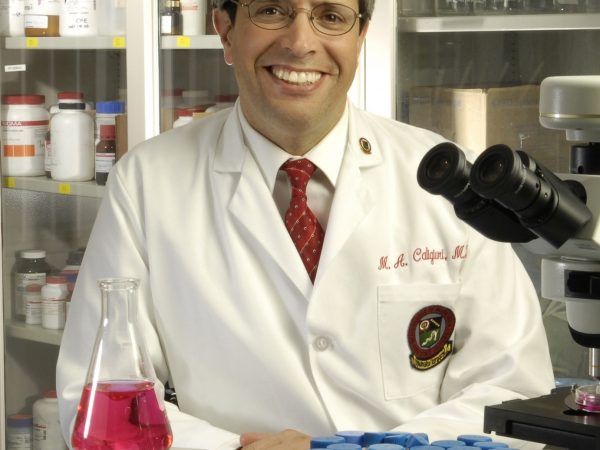Upcoming FDA-AACR-ASA Workshop to Examine Overall Survival in Oncology Clinical Trials
When faced with a cancer diagnosis, patients often find themselves asking, “How long will I live? Which treatments will help me live the longest?”
While no one can predict any individual patient’s outcomes accurately, physicians can estimate how effective certain therapies might be based on clinical trial results.
Overall survival, which measures how long patients live after receiving a particular treatment, has long been considered the gold standard for understanding a therapy’s efficacy and safety in a clinical trial. But in recent years, this metric has become increasingly difficult to evaluate.
Why is this? And how can researchers, regulators, and statisticians work together to overcome hurdles?
An upcoming workshop co-hosted by the American Association for Cancer Research (AACR), the U.S. Food and Drug Administration (FDA), and the American Statistical Association (ASA) will bring together stakeholders from across the drug development spectrum to examine the challenges to measuring overall survival in clinical trials and to discuss potential approaches to improve collection and analysis of this important endpoint.

The FDA-AACR-ASA Workshop: Overall Survival in Oncology Clinical Trials will be held July 18, 2023, outside of Washington, D.C., and virtually for those unable to attend in person.
To learn more, we spoke with the chair of the workshop, Kenneth Anderson, MD, FAACR, a researcher at Dana-Farber/Harvard Cancer Center, a professor of medicine at Harvard Medical School, and an oncologist at Brigham and Women’s Hospital.
What is the significance of overall survival?
Overall survival has historically been the preferred endpoint for clinical trials because the ultimate goal of cancer treatment is to prolong the patient’s life. Overall survival tells us not only about the treatment’s efficacy, but also about its safety since some treatment toxicities can be fatal. When assessing an investigational therapy, the gold standard for researchers and regulators has been whether the new therapy outperforms the existing standard of care in overall survival—in other words, do patients who receive the new therapy live longer than those receiving the standard of care?
What is the objective of the FDA-AACR-ASA Workshop?
The workshop will bring together the entire community—meaning the FDA, biotech and pharma, clinical investigators and scientists represented by the AACR, statisticians, and patients, all of those who are essential to the new drug development pipeline—to discuss the issues surrounding overall survival in clinical trials and to address the many questions that have arisen about how best to measure it.
In particular, what is the appropriate paradigm for developing and evaluating novel agents in terms of clinical trial design and the use of overall survival? What should we tell potential drug developers about how to examine overall survival in different patient subgroups? How can we incorporate overall survival and safety when we talk about the benefits and risks of a novel treatment with patients? What should we communicate to the FDA regarding the utility of different metrics?
What are the challenges to measuring overall survival in clinical trials?
Although overall survival has been a good endpoint in the past for new drug approval, its utility has become difficult in recent decades. It quite simply takes too long to measure now due to the remarkable progress we’ve made in the treatment of many cancers.
We understand the diagnosis, prognosis, and treatment of cancer better than ever before. The incredible bench-to-bedside translation and progress we’ve made has led to the development of therapies that more precisely target cancer cells and spare normal cells, resulting in better responses, fewer side effects, and longer overall survival in clinical trials. In fact, in many patients, either with indolent cancers or with cancers that have been effectively treated, cancer is now a chronic illness, and patients are growing old and dying of other causes.
While other measures, known as surrogate endpoints, offer important information about drug efficacy in a shorter time frame, they have their own limitations and are not a true substitute for overall survival. Progression-free survival, which is the major surrogate endpoint that has been used so far, doesn’t always correspond with overall survival. There are examples where patients who received the study treatment had longer progression-free survival than patients in the control arm, but subsequent overall survival in larger trials was not any different between the arms.
Perhaps the best surrogate markers that are being explored are minimal residual disease measures, which allow one to identify a single tumor cell in 100,000 or a million normal cells to assess the efficacy of a therapy. Minimal residual disease has not been utilized for new drug approvals thus far but might be used in the future as an earlier endpoint to predict progression-free or overall survival.
What topics will be covered during the workshop?
The workshop includes five sessions on different topics.
The first addresses multiple facets of clinical trial design that might impact the evaluation of overall survival. For example, should we randomly assign patients to the experimental and control treatment arms, or should we assign based on certain factors? If we randomly assign patients, should we have an equal number in each treatment arm? In some cases where the experimental treatment shows benefit, patients in the control arm might be permitted to “cross over” and receive the experimental treatment before the end of the trial; how do we assess overall survival in those situations? Do we allow a different therapy to be given subsequently in a later line of therapy? Perhaps most importantly, how do we handle adverse events and their impact on overall survival? Does following overall survival allow you to identify long-term adverse events that otherwise might not be identified?
The second session centers on overall survival when it’s a prespecified endpoint, meaning the trial was designed to measure it. In these cases, how do you plan for statistical power to have a valid evaluation of overall survival? Many of the issues I just mentioned apply here, including crossover from the control arm to the experimental arm and the impact of adverse events on overall survival. In addition, how do we account for the impact of subsequent therapies on the assessment of overall survival for the primary drug being tested?
The third session discusses issues of overall survival when it’s not a prespecified endpoint. This scenario might be even more difficult to manage because it involves conducting analyses that were not originally planned when the trial was designed. What degree of uncertainty should we anticipate in such analyses? When is it appropriate to carry out these post hoc overall survival analyses?
The fourth session examines how to evaluate overall survival in different subgroups. Cancer is very heterogeneous. Both between different cancer types and within the same cancer type, there are clinical and genetic factors that account for differences in outcomes. How should we deal with this when measuring overall survival?
The final session examines the impact of overall survival on the benefit-risk analysis of cancer treatment. What length of follow-up is required for us to have sufficient confidence in a drug’s efficacy and safety? What are best practices for discussing overall survival when we speak to each other or to patients about the overall benefit-risk ratio of a certain therapy?
This session will also examine topics from the prior four sessions to assess the overall benefits and risks of measuring overall survival at early or late timepoints. The benefit-risk ratio of overall survival analyses may differ across cancer types, between indolent and aggressive disease, or across different patient populations.
What do you hope attendees take away from the workshop?
We hope that attendees come away from the workshop with an appreciation for the value of overall survival and an understanding of how to properly evaluate it. The FDA has recognized that the questions surrounding overall survival measures must be addressed in order to continue with new drug development and approvals at such a rapid pace. I anticipate that the discussions and recommendations that come out of this workshop will likely form the framework for guidance for new drug development in cancer from the FDA.
I’m very honored to be representing the AACR and working with colleagues from the FDA and the ASA, as well as clinical and biotech/pharma investigators, on this critical topic. Most importantly, we have involved patients in this workshop, and their presence and lived experiences remind us and ground us in the real purpose of all that we do.
The FDA-AACR-ASA Workshop: Overall Survival in Oncology Clinical Trials is free to attend and open to the public. Register here.



